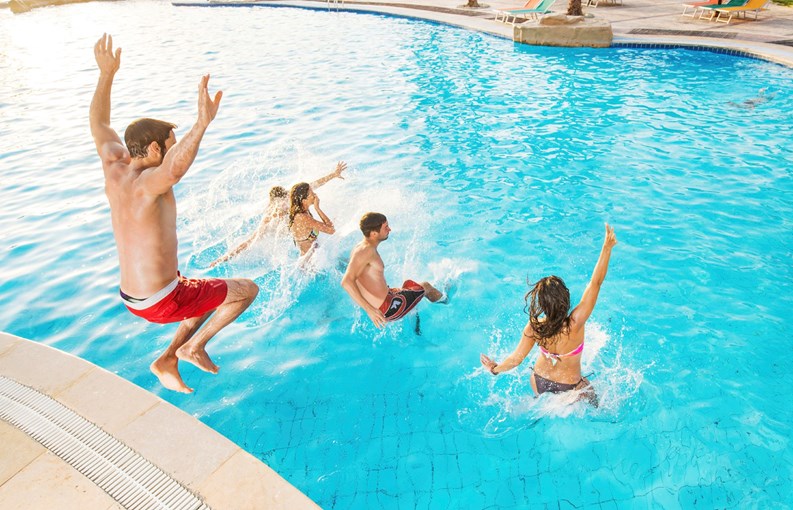Some lucky co-ops and condos offer the benefits of an indoor or outdoor swimming pool for their residents; it’s a splashy amenity that many people request when looking for a home…but there are many drawbacks, issues, and liabilities that come with managing a pool.
Anyone who is considering living in a building with a pool, or thinking of running for board in a building with a pool, should learn about safety measures, diving boards, and other pools feature before diving in.
Pooling Concerns
Indeed, there are serious dangers involved with condo and co-op pools. From 2005 to 2007, there were 385 pool-related drownings for children younger than 15, and from 2007 to 2009, there were an average of 4,200 emergency department-treated submersions for children younger than the age of 15, according to the U.S. Consumer Product Safety Commission (CPSC).
Shockingly, 54 percent of the injuries from 2007 to 2009 and 74 percent of the fatalities between 2005 and 2007 (involving children younger than 15) occurred at a residence.
And according to reported from the USA Swimming Foundation, in 2014 alone, between Memorial Day and Labor Day, at least 175 children nationwide between the ages of one and 14 drowned in swimming pools and spas. Of the 174 reports, 112 victims were children younger than five.
“The standard of care today is that individuals who are responsible for the care of swimming pools and spas should have a minimum education level,” says Thomas L. Lachocki, Ph.D., CEO of the National Swimming Pool Foundation, a non-profit organization based in Colorado Springs, Colorado. “The most common, the most respected and most widely accepted by Health Departments is the Certified Pool/Spa Operator Certification course. The Centers for Disease Control & Prevention issued the Model Aquatic Health Code at the end of summer 2014. The model is being considered by many health departments around the country. Operating training and many other operational and design factors are covered in this code.”
“One thing HOAs can do to make sure their pool is as safe as possible to make sure their staff gets trained properly to protect them from lawsuits,” says Trevor Sherwood, owner of Pool Operation Management, based in Brick. “A lot of the states require that whoever works on your pool is a certified operator. It’s also important to know the current rules, own all the proper safety equipment, and keep the pool up to code. There are requirements regarding signage, also.”
A Need for Change
“Educating communities on the potential dangers of swimming pools is a critical tool in saving the lives of our children,” says Florida Congresswoman Debbie Wasserman Schultz, D-23, the author of the Virginia Graeme Baker Pool and Spa Safety Act.
The result of a tragic accident in June 2002, the Virginia Graeme Baker Pool and Spa Safety Act was introduced after suction from a Jacuzzi drain trapped the 7-year-old granddaughter of former Secretary of State James Baker III under water; it took two men to pull her from the drain, but it happened too late and she drowned.
Virginia’s mother, Nancy Baker, advocated for pool and spa safety and won support for a law requiring anti-entrapment drain covers and other safety devices. It was enacted by Congress and signed by President Bush in 2007, and became law in 2008. It prevents hidden hazards of drain entrapment in pools and spas. “I understand the need to bring together the public and dedicated partners in the water safety community to begin a national conversation about water safety,” Baker says.
Despite that law going into action, there was a similar pool drain accident in a Key Biscayne, Florida condo pool in 2009 after a 3-year-old girl’s arm was trapped in a skimmer drain. Fortunately, she survived the accident; though, if the pool had installed the new domed-shaped drains or large flat drains resulting from the VGB Pool and Spa Safety Act, then chances are, the girl wouldn’t have become stuck, officials said.
While items like the sonar are optional, there are many potentially lifesaving safety devices and requirements that are required in the state of New Jersey. In fact, state law mandates specific rules and regulations that make swimming even safer; though, these rules are more expensive—and complicated—to operate a pool in a condo setting, Roaker says. Most importantly, a lifeguard must be present at all times the pool is open: one lifeguard per 75 people (or one lifeguard per 25 feet).
Maintaining Overflowing Costs
Even though there is no iron-clad rule in New Jersey stating that a lifeguard must be on duty, Roaker recommends having two during pool hours.
“If you don’t have a single entrance, you would have to double the staff,” Roaker says. This is to ensure the lifeguard knows where everyone is, and doesn’t think that someone has left the pool area when they are, in fact, under water.
“Some of the hotels and motels definitely should have lifeguards but some of the condos can get waivers,” adds Sherwood. “Some of the over 55 communities get waivers too.”
More Ways to Save
While operating a pool is an incredibly expensive ordeal, there are ways to reduce costs. For instance, one can limit the number of hours a pool is open, thus, paying for fewer lifeguard hours. Insurance rates will go down, largely because such rates are determined by the number of hours the pool is in operation.
In New Jersey, peak hours of pool operation are from 12 p.m. to 8 p.m. during the week and from 11 a.m. to 7 p.m. on weekends and on holidays. “That’s when the majority of communities like to be open for the pools,” Roaker says. “This way, they get a chance after dinner to go for a swim, and on the weekends.”
The amount of staff needed to properly maintain a pool depends on a number of variables. “It depends on the size of the pool and also how busy the pool is going to be,” says Sherwood. “But we do a lot of pool safety and we bring lots of pools up to code and emergencies come up.”
Licensing in New Jersey
In New Jersey, the Division of Consumer Affairs, along with the New Jersey Department of Health, oversees pool safety for pool operators. Many licensing requirements are outlined by the state to ensure that a pool is sanitary, healthful, and a safe environment. Thus, Roaker recommends that condos secure a management company as soon as they acquire a pool. The management company will make sure that all the proper licensing is in place and requirements are followed.
In most cases the pool operator completes daily operation records for the pool and keeps a record of those forms at the facility for 12 months. The records include everything from chlorine levels, water testing frequency, pH testing, water clarity, bather load, depth markings, cyanuric acid levels, and CPO required.
In order to become a pool operations manager, one has to enroll in a two-day course followed by an open book written test at an approved site. The certification course teaches individuals basic knowledge and techniques of pool and spa operations so they are able to maintain the pool and satisfy the state requirements. The CPO certification is valid for 5 years.
Learn more about the course and the requirements at www.pooloperationmanagement.com. However, having a qualified water treatment operator isn’t all that is required.
The person managing the pool needs to know that bathrooms must be provided, except when bathrooms are available within 300 feet of the pool, or within one floor above or below the pool. All showers should must reach a temperature of at least 90 degrees, and no more than 110 at a rate of at least 1½ gallons per minute per showerhead.
These are all issues that the manager would handle…taking the headache away from the building community itself.
Danielle Braff is a freelance writer and a frequent contributor to The New Jersey Cooperator. Freelance writer Christy Smith-Sloman contributed to this article.







Leave a Comment